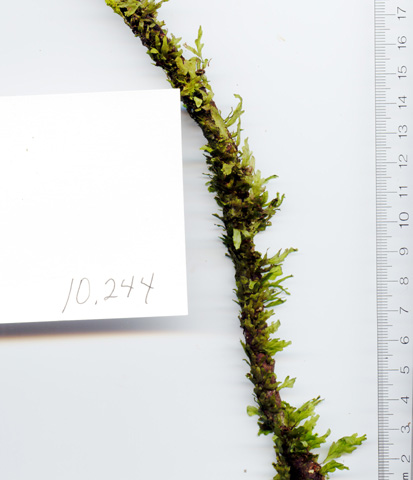Hymenophyllaceae
|
Hymenophyllaceae |
|
|
Plants epiphytic, terrestrial, or on rock. Stems long-creeping, often threadlike and intertwining, or short-erect, protostelic, bearing brown hairs of 1--2 types. Roots sparse or absent. Leaves small, 0.5--20 × 0.2--5 cm, often forming dense mats. Petiole short, threadlike to wiry, often winged part or entire length. Blade ovate or oblong to lanceolate, simple to decompound, usually 1 cell thick between veins (except Trichomanes membranaceum Linnaeus), entire or dentate; scales or simple and/or stellate hairs often borne on veins or leaf margins. Veins free and divergent, occasionally present as unattached 'false' veins. Sori marginal on vein ends, enclosed by 2-valved or conic involucres. Sporangia borne on moundlike receptacle or on elongate 'bristle,' sessile or short-stalked; annulus oblique. Spores green, globose, trilete. Gametophytes filamentous or ribbonlike or a combination of both, much branched, 0.2--1 cm, often bearing gemmae, persistent, clone-forming by vegetative reproduction. Species outside the flora display a wide range of morphologies and habits, and many are somewhat larger than North American species. Some authors divide the Hymenophyllaceae into 30 or more genera. The subdivisions of these genera are treated here as subgenera and sections, following C. V. Morton (1968). Although plants of the Hymenophyllaceae clearly have the capacity to withstand periodic desiccation and freezing, they have a delicate nature that requires they grow in deeply sheltered habitats of nearly continuous high moisture and humidity. This undoubtedly accounts for the relative rarity of all species in the flora. Possibly they are currently restricted from more widespread pre-Pleistocene occurrences. All owe their continuing existence largely or entirely to vegetative propagation by either the sporophyte or gametophyte generation. The capacity for vegetative reproduction and dispersal by gametophytes of the Hymenophyllaceae allows gametophyte colonies to persist indefinitely without completing a life cycle. In the flora, several species are maintained exclusively as gametophytes with sporophytes rarely or never produced.
|
|
